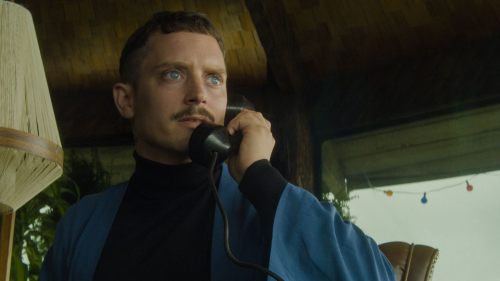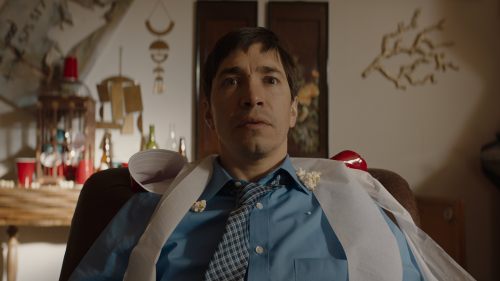Fantastic Fest: THE INVITATION And The Ghosts Of Who We Were
(Note: As The Invitation is a DHF title, this is not a formal review, but rather a spoiler-free personal response.)
The Invitation speaks to life experience.
That’s not to say a twenty-one-year-old, starry-eyed film-schooler wouldn’t be able to appreciate the formal execution of Karyn Kusama’s locked-in horror picture. The Invitation is as tightly executed as any genre film in recent memory; forgoing the jangly handheld camerawork of most single space “indie horror” exercises, in favor of immaculately framed compositions intent on unsettling the audience with their use of dissociating space. The anxiety mounts until a seemingly innocent dinner party explodes into a flurry of horrific events, escalating beyond what most would dream possible. However, the truly intriguing elements of the movie occur within the empty chasms between the characters, as each approach their own unique “end” in a different manner. What Kusama has crafted (along with writers Phil Hay and Matt Manfredi) is a ghost story that’s going to speak to any who have lost a piece of themselves; be it a relationship, family member or even their seemingly cemented role in life.
After a loss, it’s almost impossible to return to the places you once called “home” without feeling as if everything has changed. The house you shared with a now estranged ex holds an isolating energy – every room slightly chillier than you recall. The bathroom mirrors expose a visage you no longer recognize as your own. At least, not the same smiling face that used to utilize this reflective surface before crawling into bed with the one you’d created a life with. Memories are tucked away into corners and cabinets, like ghosts waiting to slip out and transport you back to a time when things seemed more “correct” than they are now – purposeful and full of possibility. Worst of all is the fact that you know you will never be able to regain that sense of familiarity with a space that used to welcome you with open arms, comforting and caring when the world would sometimes shrug you off without so much as a second glance. Your home is now an empty vessel, occupied only by the spirits of a past life.
Kusama taps into this humanely haunted essence by having Will (Logan Marshall-Green) return to his old lavish home in order to attend a low-key soirée being thrown by his ex-wife, Eden (Tammy Blacnhard), and her new partner, David (Michiel Huisman). Providing staunch support is Will’s new girlfriend, Kira (Emayatzy Corindealdi), who is handling the obviously fragile man with kid gloves. Neither knows what to expect, as Eden and David disappeared together for almost two years, and the other friends attending all maintained aloofness in the wake of Will and Eden’s familial dissolution. The new couple is knowingly walking into an emotional minefield, but at least they’re doing so hand-in-hand.
Alienation amongst old friends can lead to an acute form of insanity, and Will experiences this phenomena first hand. Though they’re all smiling and drinking and having a great time, it’s hard not to stare at those who witnessed your full personal collapse as being akin to archaeologists, hoping to excavate your former self. They see the “new you” as nothing more than a façade; a tacky Halloween costume fit to be discarded once November 1 rolls around. It certainly doesn’t help that any sense of comfort is shattered once Will lays eyes on Eden, who seems to have bettered herself by pursuing a new and exciting purpose in the desert. Her luminous white dress clashes with Will’s bearded face, long hair and hooded eyes. It seems that both vanished into a wasteland, yet only one discovered a new fountain of hope. This only helps to hurt Kira, who questions whether or not the man she struggles to encourage and push forward is nothing more than a walking skeleton, the bones of what he used to believe crumbling on the inside of his thinly worn flesh suit.
That’s not to say Will is completely alone in his grief, as those surrounding him are also approaching personal ends they are concurrently denying. Ben (Jay Larson) tells Will about the ever-expanding crevasse budding between he and his wife (who chose not to attend the festivities). The only way the two ever feel connected is through “great sex”, which seems to be the only reason Ben remains in the marriage. Gina (Michelle Krusiec) constantly makes excuses for Choi (Karl Yune), who is never available, and currently running late for the party. Unlike Will and Eden, these individuals are putting off facing their own inevitable demises, more than likely to their detriment. It’s a rejection of accelerative motion, as each spins their spiritual wheels.
Mysterious, hulking stranger, Pruitt (John Caroll Lynch), becomes the physical manifestation of what Eden and David found in the desert. Pruitt extolls the virtues of meeting your own demons head on, narrating a personal tragedy so devastating it causes one guest to depart. The outsider holds a severe darkness in his belly, and when he, Eden and David share a video of the “treatment” they received from Dr. Joseph (Toby Huss), an enigmatic New Age “healer”, it becomes apparent that sometimes grief can lead a person into the arms of conceivably sinister forces. In the wake of disaster, human beings are going to search out anything to help mend the abrasions they withstood, and predators often prey on these weak and wounded.
Complaints have been lodged that The Invitation is too much of a “slow burn”, leading to a violent climax that seems somewhat unearned. Yet these critiques seem to miss the point of the emotive architecture being carefully crafted during the movie’s first two acts. The Invitation is very much a movie about the pain of being an adult, and the numerous deaths we have to face before our feeble mortal form shuffles off this mortal coil. It’s also one of the few genre films that dares to ask heady, emotionally jarring questions about universal existence. Is the pain we endure during our lifetimes worth it? What if we could mercifully end all suffering, emotional and physical? Is it our place to even ponder these possibilities? What Karyn Kusama has put together with this exquisite chiller is a horror movie for adults with a solid amount of living under their belts. It connects with those who have sustained true loss in their lives, and who seek the same spiritual closure as those who have sat down for this ill-fated dinner party.



